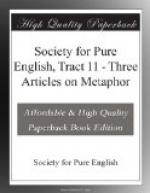’When the Chairman of Committees—a politician of their own hue—allowed Mr. Maddison to move his amendment in favour of secular education, a decision which was not quite in accordance with precedent, the floodgates of sectarian controversy were opened, and the apple of discord—the endowment of the gospel of Cowper-Temple—was thrown into the midst of the House of Commons.’ What a mixture of metaphor! One pictures this gospel-apple battling with the stream released by the opened floodgates. In point of fact, the floodgates and the apple are successive metaphors, unmixed; the mixing of them is done by the critic himself, not by the criticized; and as to gospel-apple, by which it is hinted that the mixture is triple, the original writer had merely mentioned in the gospel phrase the thing compared by the side of what it is compared to, as when one explains the Athens of the North by adding Edinburgh.
Writers who are on the defensive apologize for change and mixture of metaphors as though one was as bad as the other; the two sins are in fact entirely different; a man may change his metaphors as often as he likes; it is for him to judge whether the result will or will not be unpleasantly florid; but he should not ask our leave to do it; if the result is bad, his apology will not mend matters, and if it is not bad no apology was called for. On the other hand, to mix metaphors, if the mixture is real, is an offence that should have been not apologized for, but avoided. Whichever the phrase, the motive is the same—mortal fear of being accused of mixed metaphor.
_...showed that Free Trade could provide the jam without recourse being had to Protective food-taxes: next came a period in which (to mix our metaphors) the jam was a nice slice of tariff pie for everybody, but then came the Edinburgh Compromise, by which the jam for the towns was that there were to be..._ When jam is used in three successive sentences in its hackneyed sense of consolation, it need hardly be considered in the middle one of them a live metaphor at all; however, the as-good-as-dead metaphor of jam is capable of being stimulated into life if any one is so foolish as to bring into contact with it another half-dead metaphor of its own (i.e. of the foodstuff) kind, and it was, after all, mixing metaphors to say the jam was a slice of pie; but then the way of escape was to withdraw either the jam or the pie, instead of forcing them together down our throats with a ramrod of apology.
Time sifts the richest granary, and posterity is a dainty feeder. But Lyall’s words, at any rate—to mix the metaphor—will escape the blue pencil even of such drastic editors as they. Since all three metaphors are live ones, and they are the sifter and the feeder, the working of these into grammatical connexion with the blue pencil does undoubtedly mix metaphors. But then our author gives us to understand that he knows he is doing it, and surely that is enough. Even so some liars reckon that a lie is no disgrace provided that they wink at a bystander as they tell it, even so those who are addicted to the phrase ‘to use a vulgarism’ expect to achieve the feat of being at once vulgar and superior to vulgarity.




